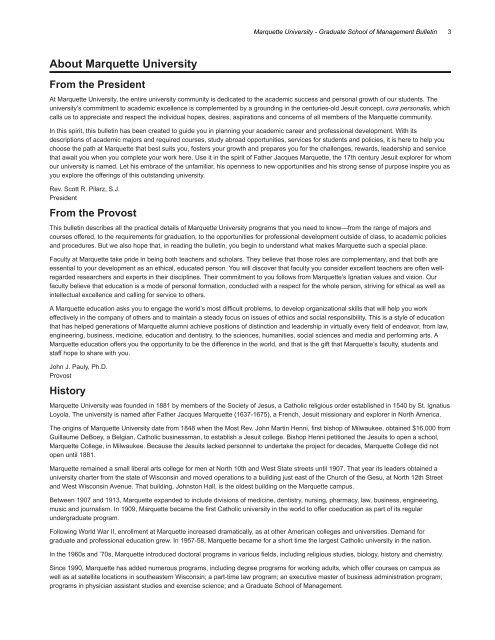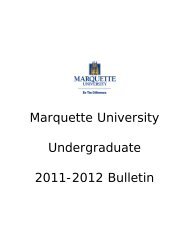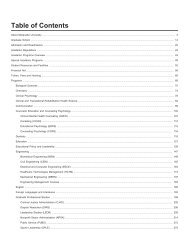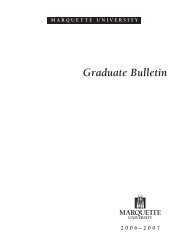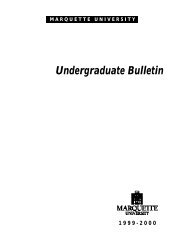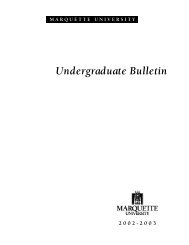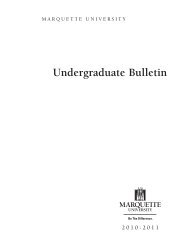2012-2013 - Marquette University Bulletin
2012-2013 - Marquette University Bulletin
2012-2013 - Marquette University Bulletin
Create successful ePaper yourself
Turn your PDF publications into a flip-book with our unique Google optimized e-Paper software.
<strong>Marquette</strong> <strong>University</strong> - Graduate School of Management <strong>Bulletin</strong> 3<br />
About <strong>Marquette</strong> <strong>University</strong><br />
From the President<br />
At <strong>Marquette</strong> <strong>University</strong>, the entire university community is dedicated to the academic success and personal growth of our students. The<br />
university’s commitment to academic excellence is complemented by a grounding in the centuries-old Jesuit concept, cura personalis, which<br />
calls us to appreciate and respect the individual hopes, desires, aspirations and concerns of all members of the <strong>Marquette</strong> community.<br />
In this spirit, this bulletin has been created to guide you in planning your academic career and professional development. With its<br />
descriptions of academic majors and required courses, study abroad opportunities, services for students and policies, it is here to help you<br />
choose the path at <strong>Marquette</strong> that best suits you, fosters your growth and prepares you for the challenges, rewards, leadership and service<br />
that await you when you complete your work here. Use it in the spirit of Father Jacques <strong>Marquette</strong>, the 17th century Jesuit explorer for whom<br />
our university is named. Let his embrace of the unfamiliar, his openness to new opportunities and his strong sense of purpose inspire you as<br />
you explore the offerings of this outstanding university.<br />
Rev. Scott R. Pilarz, S.J.<br />
President<br />
From the Provost<br />
This bulletin describes all the practical details of <strong>Marquette</strong> <strong>University</strong> programs that you need to know—from the range of majors and<br />
courses offered, to the requirements for graduation, to the opportunities for professional development outside of class, to academic policies<br />
and procedures. But we also hope that, in reading the bulletin, you begin to understand what makes <strong>Marquette</strong> such a special place.<br />
Faculty at <strong>Marquette</strong> take pride in being both teachers and scholars. They believe that those roles are complementary, and that both are<br />
essential to your development as an ethical, educated person. You will discover that faculty you consider excellent teachers are often wellregarded<br />
researchers and experts in their disciplines. Their commitment to you follows from <strong>Marquette</strong>’s Ignatian values and vision. Our<br />
faculty believe that education is a mode of personal formation, conducted with a respect for the whole person, striving for ethical as well as<br />
intellectual excellence and calling for service to others.<br />
A <strong>Marquette</strong> education asks you to engage the world’s most difficult problems, to develop organizational skills that will help you work<br />
effectively in the company of others and to maintain a steady focus on issues of ethics and social responsibility. This is a style of education<br />
that has helped generations of <strong>Marquette</strong> alumni achieve positions of distinction and leadership in virtually every field of endeavor, from law,<br />
engineering, business, medicine, education and dentistry, to the sciences, humanities, social sciences and media and performing arts. A<br />
<strong>Marquette</strong> education offers you the opportunity to be the difference in the world, and that is the gift that <strong>Marquette</strong>’s faculty, students and<br />
staff hope to share with you.<br />
John J. Pauly, Ph.D.<br />
Provost<br />
History<br />
<strong>Marquette</strong> <strong>University</strong> was founded in 1881 by members of the Society of Jesus, a Catholic religious order established in 1540 by St. Ignatius<br />
Loyola. The university is named after Father Jacques <strong>Marquette</strong> (1637-1675), a French, Jesuit missionary and explorer in North America.<br />
The origins of <strong>Marquette</strong> <strong>University</strong> date from 1848 when the Most Rev. John Martin Henni, first bishop of Milwaukee, obtained $16,000 from<br />
Guillaume DeBoey, a Belgian, Catholic businessman, to establish a Jesuit college. Bishop Henni petitioned the Jesuits to open a school,<br />
<strong>Marquette</strong> College, in Milwaukee. Because the Jesuits lacked personnel to undertake the project for decades, <strong>Marquette</strong> College did not<br />
open until 1881.<br />
<strong>Marquette</strong> remained a small liberal arts college for men at North 10th and West State streets until 1907. That year its leaders obtained a<br />
university charter from the state of Wisconsin and moved operations to a building just east of the Church of the Gesu, at North 12th Street<br />
and West Wisconsin Avenue. That building, Johnston Hall, is the oldest building on the <strong>Marquette</strong> campus.<br />
Between 1907 and 1913, <strong>Marquette</strong> expanded to include divisions of medicine, dentistry, nursing, pharmacy, law, business, engineering,<br />
music and journalism. In 1909, <strong>Marquette</strong> became the first Catholic university in the world to offer coeducation as part of its regular<br />
undergraduate program.<br />
Following World War II, enrollment at <strong>Marquette</strong> increased dramatically, as at other American colleges and universities. Demand for<br />
graduate and professional education grew. In 1957-58, <strong>Marquette</strong> became for a short time the largest Catholic university in the nation.<br />
In the 1960s and ’70s, <strong>Marquette</strong> introduced doctoral programs in various fields, including religious studies, biology, history and chemistry.<br />
Since 1990, <strong>Marquette</strong> has added numerous programs, including degree programs for working adults, which offer courses on campus as<br />
well as at satellite locations in southeastern Wisconsin; a part-time law program; an executive master of business administration program;<br />
programs in physician assistant studies and exercise science; and a Graduate School of Management.


